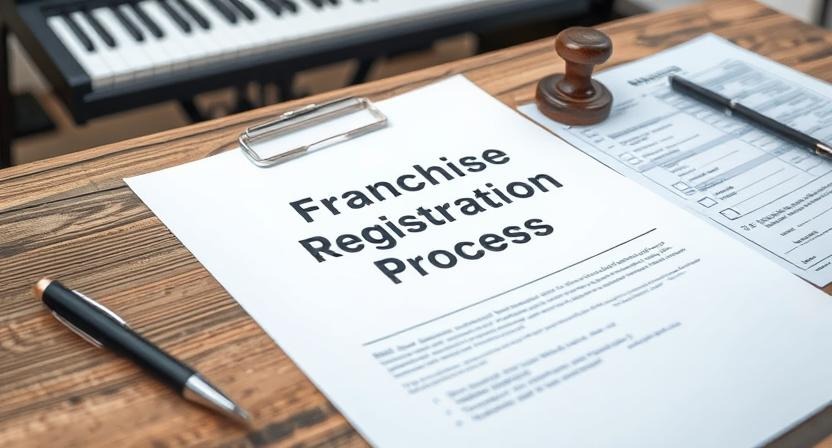It is challenging to decide to run independently or Franchise model. Starting a music academy is like composing a song, every note (decision) matters. Some music educators dream of running their own independent institute, while others see the potential in expanding through a franchise model. But which path is right for you? Should you stay independent or scale up with franchises?
This guide will walk you through the pros and cons of both models, the financial and legal aspects of franchising, how to set franchise fees, and even real-life case studies of music academies that successfully expanded.
Let’s explore your options, just like a musician exploring different melodies before composing the perfect piece. 🎶
1. Pros & Cons of Running an Independent Music Institute
Running an independent music academy gives you complete control over your brand, teaching methods, and business operations. However, it also comes with challenges. Let’s break it down:
Pros of Running an Independent Music Academy
- Full Creative Control: You decide how your academy looks, feels, and functions. From teaching styles to branding, everything reflects your vision.
- No Revenue Sharing: Unlike a franchise, all earnings stay with you. You don’t have to pay royalties or share profits with franchisees.
- Personalized Growth: You expand at your own pace, without pressure from external investors or partners.
- Direct Connection with Students: You build a personal relationship with students and their parents, creating a strong community around your academy.
Cons of Running an Independent Music Academy
- Slow Expansion: Opening multiple branches on your own requires significant investment and effort. Growth is slow compared to franchising.
- High Operational Costs: Rent, staff salaries, marketing, and equipment costs fall entirely on you.
- Limited Brand Reach: Unless you invest heavily in advertising, your academy’s brand awareness will grow slowly.
- More Responsibilities: As the sole owner, you have to manage everything, from hiring teachers to handling financials.
2. Decided run music academy independently or franchise model? How to Expand Your Music Academy Through Franchising?
If you dream of growing your academy without handling every branch yourself, franchising can be a great option.
How Does a Franchise Model Work?
In a franchise model, you (the franchisor) allow others (franchisees) to use your brand, business model, and teaching methods in exchange for a fee. You provide training, support, and marketing strategies to ensure consistency.
Benefits of Franchising Your Music Academy
- Faster Expansion: Your brand grows without you having to open every location yourself. Franchisees invest in setting up new branches, saving you time and resources.
- Additional Revenue Streams: You earn from franchise fees, royalties, and training programs.
- Shared Financial Risk: Franchisees bear the cost of setting up new branches, reducing your financial burden.
- Stronger Brand Presence: More locations mean greater visibility and credibility in the market.
Note: Franchising also requires careful planning and quality control. You need to ensure that every branch maintains the same standard of education and service.
3. Legal & Financial Aspects of a Franchise Model
Franchising isn’t just about expansion, it also involves legal and financial considerations. Here’s what you need to know:
Legal Steps to Set Up a Franchise in India
- Register Your Brand & Trademark: Protect your academy’s name, logo, and identity by registering a trademark. This prevents others from using your brand without permission.
- Create a Franchise Agreement: This legal document outlines the terms, responsibilities, and financial expectations between you (the franchisor) and your franchisees.
- Comply with Tax Laws: Franchisees must pay GST (Goods & Services Tax) in India, and you may have to manage financial records accordingly.
- Set Standard Operating Procedures (SOPs): These guidelines help maintain quality across all franchise branches.
For more details, you can check this guide on franchising laws in India.
4. How Much to Charge as a Franchise Fee?
Setting the right franchise fee is crucial. Charge too high, and you may scare away potential franchisees. Charge too low, and you might not earn enough to support your business.
What Does a Franchise Fee Cover?
- Right to use your brand name
- Training for staff and teachers
- Marketing and promotional support
- Business setup guidance
Types of Franchise Fees
- Initial Franchise Fee: A one-time payment to join the franchise. This typically ranges from ₹3 lakh to ₹15 lakh, depending on the brand’s reputation.
- Royalty Fee: A percentage of the franchisee’s revenue paid monthly or quarterly. This is usually 5%-15% of their earnings.
- Marketing Fee: Some academies charge a separate fee for national or digital marketing campaigns.
The exact fee structure depends on your academy’s brand value and the level of support you provide to franchisees.

5. Steps to Register Your Institute as a Franchise in India
1. Research & Plan Your Franchise Model
Decide whether you’ll offer a single-unit franchise (one branch per franchisee) or a multi-unit franchise (one franchisee can open multiple branches).
2. Register Your Business & Trademark
Ensure your academy is legally registered as a private limited company or LLP (Limited Liability Partnership). Then, apply for a trademark to protect your brand identity.
3. Develop a Franchise Agreement
Consult a legal expert to draft a detailed agreement covering all financial, operational, and legal aspects.
4. Standardize Your Teaching Methods
Create structured lesson plans and training modules to ensure consistency across all franchise branches.
5. Market Your Franchise Opportunity
Promote your franchise model through your website, social media, and franchise marketplaces like Franchise India.
Real-Life Case Studies of Music Academies That Expanded
Case Study 1: Shankar Mahadevan Academy
Established in 2011 by renowned composer and singer Shankar Mahadevan, the academy offers both online and offline music education. While the academy provides online courses accessible globally, it also seeks partnerships with music schools worldwide to spread the “Joy of Music,” as indicated in their Affiliate Programs. This approach allows the academy to maintain educational quality while expanding its reach.
Case Study 2: Furtados School of Music
Originating from the legacy of Furtados, a 150-year-old music retail brand, Furtados School of Music (FSM) has significantly impacted music education in India. Founded by Tanuja Gomes and Dharini Upadhyaya, FSM has expanded its presence by partnering with schools across major cities in India, aiming to integrate music programs into school curricula and offer after-school learning at centers and through home tuitions, as highlighted in their expansion plans. This strategy has enabled FSM to teach over 75,000 students across 150 schools, as reported by YourStory.
Both academies have leveraged their unique strategies to expand their reach, contributing significantly to the proliferation of music education in India and beyond.
Which Model is Right for You?
Both independent music academies and franchise models have their strengths. If you prefer full control and a personal connection with students, staying independent might be the best choice. However, if you dream of expanding your brand quickly while reducing financial risk, franchising is worth considering.
Either way, music education is a noble profession, and growing your academy, whether independently or through franchising, means shaping the future of budding musicians. 🎶
Frequently Asked Questions (FAQs)
1. Is franchising a music academy profitable?
Yes! Franchising helps you earn through franchise fees, royalties, and training programs. However, success depends on your brand reputation and quality of training.
2. Do I need legal documents to franchise my music academy?
Absolutely! A franchise agreement, brand registration, and tax compliance documents are essential to protect your business legally.
3. How much investment does a franchisee need to open a branch?
It varies based on location, size, and brand reputation. On average, franchisees need ₹5 lakh to ₹20 lakh to start a music academy.
Also Read: How to Grow Your Music Academy with a Franchise Model


